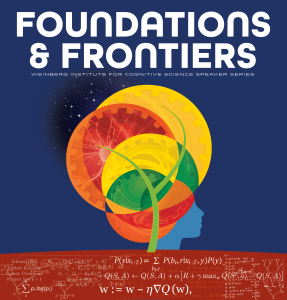Presented By: Weinberg Institute for Cognitive Science
Foundations and Frontiers Speaker Series
Max Kleiman-Weiner, Common Sense Machines and MIT

Max Kleiman-Weiner is a co-founder of Common Sense Machines. He was previously a fellow at Harvard in the Data Science Institute and Center for Research on Computation and Society and completed a PhD in Computational Cognitive Science at MIT where he was a NSF and Hertz Foundation Fellow. His thesis won the Robert J. Glushko Prize for Outstanding Doctoral Dissertation in Cognitive Science. He has received best paper awards at COGSCI and RLDM for models of human cooperation and the William James Award at SPP for computational work on moral learning. Max was Co-Founder and Chief Scientist of Diffeo which was acquired by Salesforce in 2019. Previously, he was a Fulbright Fellow in Beijing, earned an MSc in Statistics as a Marshall Scholar at Oxford, and did his undergraduate work at Stanford as a Goldwater Scholar.
TITLE
Reverse Engineering Human Cooperation
ABSTRACT
Human cooperation is distinctly powerful. We collaborate with others to accomplish together what none of us could do on our own; we share the benefits of collaboration fairly and trust others to do the same. Even young children understand, learn from, and collaborate with others in ways that are unparalleled in other animal species and are still lacking in our most sophisticated artificial intelligences. What are the cognitive representations and processes that underlie these distinct abilities and what are their origins?
In the Foundations portion of the talk, I will review models of the emergence of cooperation that have been worked out over the past 50 years in game theory, psychology, evolutionary biology, and computer science. While highly influential, these models leave out some of the most important cognitive capacities that enable the unprecedented scale and scope of human cooperation. In the Frontiers portion, I will present a computational framework based on the integration of individually rational, hierarchical Bayesian models of learning, together with socially rational game-theoretic models of cooperation. In computational and behavioral experiments I will show how this framework can explain how the cognitive structures underlying cooperation might evolve, social knowledge can be learned, and how cooperative behavior is generalized in the moment across an infinitude of possible situations: inferring the intentions and reputations of others, distinguishing who is friend or foe, and learning a new moral value all from just a few observations of behavior.
__________
The Foundations & Frontiers Speaker Series brings leading cognitive scientists to U-M to present a special pair of presentations on the same day. The first presentation serves as an introduction to an important theoretical idea or method in the field - the Foundations. The second presentation concerns the application of that idea or method to an innovative topic, thus exploring the Frontiers of the field in a way that highlights the significance of the theoretical idea.
TITLE
Reverse Engineering Human Cooperation
ABSTRACT
Human cooperation is distinctly powerful. We collaborate with others to accomplish together what none of us could do on our own; we share the benefits of collaboration fairly and trust others to do the same. Even young children understand, learn from, and collaborate with others in ways that are unparalleled in other animal species and are still lacking in our most sophisticated artificial intelligences. What are the cognitive representations and processes that underlie these distinct abilities and what are their origins?
In the Foundations portion of the talk, I will review models of the emergence of cooperation that have been worked out over the past 50 years in game theory, psychology, evolutionary biology, and computer science. While highly influential, these models leave out some of the most important cognitive capacities that enable the unprecedented scale and scope of human cooperation. In the Frontiers portion, I will present a computational framework based on the integration of individually rational, hierarchical Bayesian models of learning, together with socially rational game-theoretic models of cooperation. In computational and behavioral experiments I will show how this framework can explain how the cognitive structures underlying cooperation might evolve, social knowledge can be learned, and how cooperative behavior is generalized in the moment across an infinitude of possible situations: inferring the intentions and reputations of others, distinguishing who is friend or foe, and learning a new moral value all from just a few observations of behavior.
__________
The Foundations & Frontiers Speaker Series brings leading cognitive scientists to U-M to present a special pair of presentations on the same day. The first presentation serves as an introduction to an important theoretical idea or method in the field - the Foundations. The second presentation concerns the application of that idea or method to an innovative topic, thus exploring the Frontiers of the field in a way that highlights the significance of the theoretical idea.